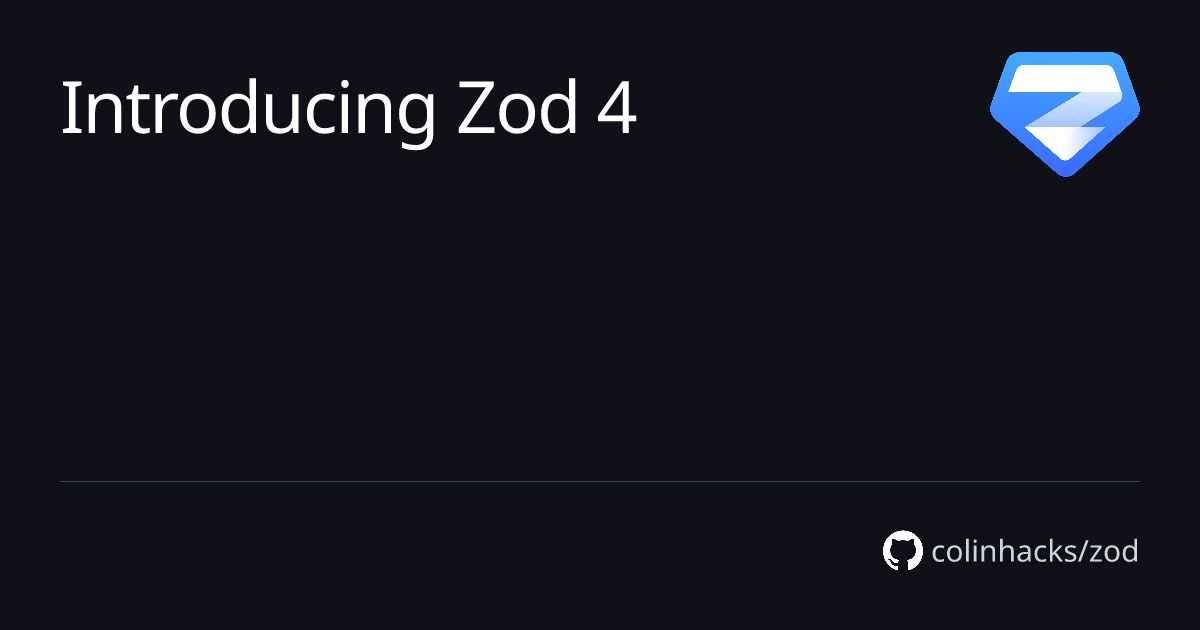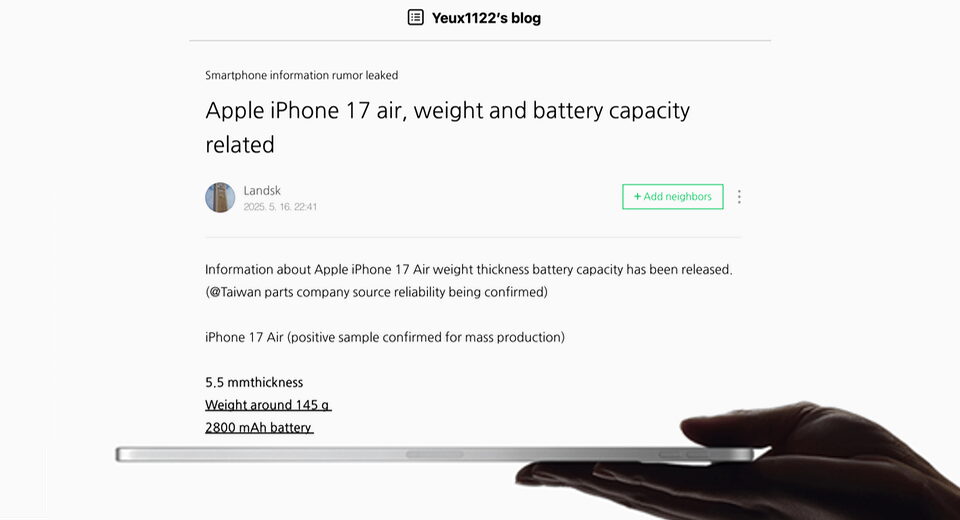Zod 4

After a year of active development: Zod 4 is now stable! It's faster, slimmer, more tsc-efficient, and implements some long-requested features.
Huge thanks to Clerk, who supported my work on Zod 4 through their extremely generous OSS Fellowship. They were an amazing partner throughout the (much longer than anticipated!) development process.
To simplify the migration process both for users and Zod's ecosystem of associated libraries, Zod 4 is being published alongside Zod 3 as part of the [email protected] release. To upgrade:
npm upgrade zod@^3.25.0
Then import Zod 4 from the "/v4" subpath:
import { z } from "zod/v4";
Refer to the Migration guide for a complete list of breaking changes. This page covers the new features and improvements.
Why a new major version?
Zod v3.0 was released in May 2021 (!). Back then Zod had 2700 stars on GitHub and 600k weekly downloads. Today it has 37.8k stars and 31M weekly downloads (up from 23M when the beta came out 6 weeks ago!). After 24 minor versions, the Zod 3 codebase had hit a ceiling; the most commonly requested features and improvements require breaking changes.
Zod 4 fixes a number of long-standing design limitations of Zod 3 in one fell swoop, paving the way for several long-requested features and a huge leap in performance. It closes 9 of Zod's 10 most upvoted open issues. With luck, it will serve as the new foundation for many more years to come.
For a scannable breakdown of what's new, see the table of contents. Click on any item to jump to that section.
Benchmarks
You can run these benchmarks yourself in the Zod repo:
$ git clone [email protected]:colinhacks/zod.git
$ cd zod
$ git switch v4
$ pnpm install
Then to run a particular benchmark:
$ pnpm bench <name>
14x faster string parsing
$ pnpm bench string
runtime: node v22.13.0 (arm64-darwin)
benchmark time (avg) (min … max) p75 p99 p999
------------------------------------------------- -----------------------------
• z.string().parse
------------------------------------------------- -----------------------------
zod3 363 µs/iter (338 µs … 683 µs) 351 µs 467 µs 572 µs
zod4 24'674 ns/iter (21'083 ns … 235 µs) 24'209 ns 76'125 ns 120 µs
summary for z.string().parse
zod4
14.71x faster than zod33x faster array parsing
$ pnpm bench array
runtime: node v22.13.0 (arm64-darwin)
benchmark time (avg) (min … max) p75 p99 p999
------------------------------------------------- -----------------------------
• z.array() parsing
------------------------------------------------- -----------------------------
zod3 147 µs/iter (137 µs … 767 µs) 140 µs 246 µs 520 µs
zod4 19'817 ns/iter (18'125 ns … 436 µs) 19'125 ns 44'500 ns 137 µs
summary for z.array() parsing
zod4
7.43x faster than zod36.5x faster object parsing
This runs the Moltar validation library benchmark.
$ pnpm bench object-moltar
benchmark time (avg) (min … max) p75 p99 p999
------------------------------------------------- -----------------------------
• z.object() safeParse
------------------------------------------------- -----------------------------
zod3 805 µs/iter (771 µs … 2'802 µs) 804 µs 928 µs 2'802 µs
zod4 124 µs/iter (118 µs … 1'236 µs) 119 µs 231 µs 329 µs
summary for z.object() safeParse
zod4
6.5x faster than zod3
100x reduction in tsc instantiations
Consider the following simple file:
import { z } from "zod/v4";
export const A = z.object({
a: z.string(),
b: z.string(),
c: z.string(),
d: z.string(),
e: z.string(),
});
export const B = A.extend({
f: z.string(),
g: z.string(),
h: z.string(),
});
Compiling this file with tsc --extendedDiagnostics using "zod/v3" results in >25000 type instantiations. With "zod/v4" it only results in ~175.
The Zod repo contains a tsc benchmarking playground. Try this for yourself using the compiler benchmarks in packages/tsc. The exact numbers may change as the implementation evolves.$ cd packages/tsc
$ pnpm bench object-with-extend
More importantly, Zod 4 has redesigned and simplified the generics of ZodObject and other schema classes to avoid some pernicious "instantiation explosions". For instance, chaining .extend() and .omit() repeatedly—something that previously caused compiler issues:
import { z } from "zod/v4";
export const a = z.object({
a: z.string(),
b: z.string(),
c: z.string(),
});
export const b = a.omit({
a: true,
b: true,
c: true,
});
export const c = b.extend({
a: z.string(),
b: z.string(),
c: z.string(),
});
export const d = c.omit({
a: true,
b: true,
c: true,
});
export const e = d.extend({
a: z.string(),
b: z.string(),
c: z.string(),
});
export const f = e.omit({
a: true,
b: true,
c: true,
});
export const g = f.extend({
a: z.string(),
b: z.string(),
c: z.string(),
});
export const h = g.omit({
a: true,
b: true,
c: true,
});
export const i = h.extend({
a: z.string(),
b: z.string(),
c: z.string(),
});
export const j = i.omit({
a: true,
b: true,
c: true,
});
export const k = j.extend({
a: z.string(),
b: z.string(),
c: z.string(),
});
export const l = k.omit({
a: true,
b: true,
c: true,
});
export const m = l.extend({
a: z.string(),
b: z.string(),
c: z.string(),
});
export const n = m.omit({
a: true,
b: true,
c: true,
});
export const o = n.extend({
a: z.string(),
b: z.string(),
c: z.string(),
});
export const p = o.omit({
a: true,
b: true,
c: true,
});
export const q = p.extend({
a: z.string(),
b: z.string(),
c: z.string(),
});
In Zod 3, this took 4000ms to compile; and adding additional calls to .extend() would trigger a "Possibly infinite" error. In Zod 4, this compiles in 400ms, 10x faster.
Coupled with the upcoming tsgo compiler, Zod 4's editor performance will scale to vastly larger schemas and codebases.
2x reduction in core bundle size
Consider the following simple script.
import { z } from "zod/v4";
const schema = z.boolean();
schema.parse(true);
It's about as simple as it gets when it comes to validation. That's intentional; it's a good way to measure the core bundle size—the code that will end up in the bundle even in simple cases. We'll bundle this with rollup using both Zod 3 and Zod 4 and compare the final bundles.
| Package | Bundle (gzip) |
|---|---|
zod/v3 | 12.47kb |
zod/v4 | 5.36kb |
The core bundle is ~57% smaller in Zod 4 (2.3x). That's good! But we can do a lot better.
Introducing Zod Mini
Zod's method-heavy API is fundamentally difficult to tree-shake. Even our simple z.boolean() script pulls in the implementations of a bunch of methods we didn't use, like .optional(), .array(), etc. Writing slimmer implementations can only get you so far. That's where zod/v4-mini comes in.
npm install zod@^3.25.0
It's a Zod variant with a functional, tree-shakable API that corresponds one-to-one with zod. Where Zod uses methods, zod/v4-mini generally uses wrapper functions:
import { z } from "zod/v4-mini";
z.optional(z.string());
z.union([z.string(), z.number()]);
z.extend(z.object({ /* ... */ }), { age: z.number() });
Not all methods are gone! The parsing methods are identical in zod/v4 and zod/v4-mini.
import { z } from "zod/v4-mini";
z.string().parse("asdf");
z.string().safeParse("asdf");
await z.string().parseAsync("asdf");
await z.string().safeParseAsync("asdf");
There's also a general-purpose .check() method used to add refinements.
import { z } from "zod/v4-mini";
z.array(z.number()).check(
z.minLength(5),
z.maxLength(10),
z.refine(arr => arr.includes(5))
);
The following top-level refinements are available in zod/v4-mini. It should be fairly self-explanatory which methods they correspond to.
import { z } from "zod/v4-mini";
// custom checks
z.refine();
// first-class checks
z.lt(value);
z.lte(value); // alias: z.maximum()
z.gt(value);
z.gte(value); // alias: z.minimum()
z.positive();
z.negative();
z.nonpositive();
z.nonnegative();
z.multipleOf(value);
z.maxSize(value);
z.minSize(value);
z.size(value);
z.maxLength(value);
z.minLength(value);
z.length(value);
z.regex(regex);
z.lowercase();
z.uppercase();
z.includes(value);
z.startsWith(value);
z.endsWith(value);
z.property(key, schema); // for object schemas; check `input[key]` against `schema`
z.mime(value); // for file schemas (see below)
// overwrites (these *do not* change the inferred type!)
z.overwrite(value => newValue);
z.normalize();
z.trim();
z.toLowerCase();
z.toUpperCase();
This more functional API makes it easier for bundlers to tree-shaking the APIs you don't use. While zod/v4 is still recommended for the majority of use cases, any projects with uncommonly strict bundle size constraints should consider zod/v4-mini.
6.6x reduction in core bundle size
Here's the script from above, updated to use "zod/v4-mini" instead of "zod".
import { z } from "zod/v4-mini";
const schema = z.boolean();
schema.parse(false);
When we build this with rollup, the gzipped bundle size is 1.88kb. That's an 85% (6.6x) reduction in core bundle size compared to zod@3.
| Package | Bundle (gzip) |
|---|---|
zod/v3 | 12.47kb |
zod/v4 | 5.36kb |
zod/v4-mini | 1.88kb |
Learn more on the dedicated zod/v4-mini docs page. Complete API details are mixed into existing documentation pages; code blocks contain separate tabs for "Zod" and "Zod Mini" wherever their APIs diverge.
Zod 4 introduces a new system for adding strongly-typed metadata to your schemas. Metadata isn't stored inside the schema itself; instead it's stored in a "schema registry" that associates a schema with some typed metadata. To create a registry with z.registry():
import { z } from "zod/v4";
const myRegistry = z.registry<{ title: string; description: string }>();
To add schemas to your registry:
const emailSchema = z.string().email();
myRegistry.add(emailSchema, { title: "Email address", description: "..." });
myRegistry.get(emailSchema);
// => { title: "Email address", ... }
Alternatively, you can use the .register() method on a schema for convenience:
emailSchema.register(myRegistry, { title: "Email address", description: "..." })
// => returns emailSchema
The global registry
Zod also exports a global registry z.globalRegistry that accepts some common JSON Schema-compatible metadata:
z.globalRegistry.add(z.string(), {
id: "email_address",
title: "Email address",
description: "Provide your email",
examples: ["[email protected]"],
extraKey: "Additional properties are also allowed"
});
To conveniently add a schema to z.globalRegistry, use the .meta() method.
z.string().meta({
id: "email_address",
title: "Email address",
description: "Provide your email",
examples: ["[email protected]"],
// ...
});
For compatibility with Zod 3, .describe() is still available, but .meta() is preferred.z.string().describe("An email address");
// equivalent to
z.string().meta({ description: "An email address" });
JSON Schema conversion
Zod 4 introduces first-party JSON Schema conversion via z.toJSONSchema().
import { z } from "zod/v4";
const mySchema = z.object({name: z.string(), points: z.number()});
z.toJSONSchema(mySchema);
// => {
// type: "object",
// properties: {
// name: {type: "string"},
// points: {type: "number"},
// },
// required: ["name", "points"],
// }
Any metadata in z.globalRegistry is automatically included in the JSON Schema output.
const mySchema = z.object({
firstName: z.string().describe("Your first name"),
lastName: z.string().meta({ title: "last_name" }),
age: z.number().meta({ examples: [12, 99] }),
});
z.toJSONSchema(mySchema);
// => {
// type: 'object',
// properties: {
// firstName: { type: 'string', description: 'Your first name' },
// lastName: { type: 'string', title: 'last_name' },
// age: { type: 'number', examples: [ 12, 99 ] }
// },
// required: [ 'firstName', 'lastName', 'age' ]
// }
Refer to the JSON Schema docs for information on customizing the generated JSON Schema.
Recursive objects
This was an unexpected on. After years of trying to crack this problem, I finally found a way to properly infer recursive object types in Zod. To define a recursive type:
const Category = z.object({
name: z.string(),
get subcategories(){
return z.array(Category)
}
});
type Category = z.infer<typeof Category>;
// { name: string; subcategories: Category[] }
You can also represent mutually recursive types:
const User = z.object({
email: z.email(),
get posts(){
return z.array(Post)
}
});
const Post = z.object({
title: z.string(),
get author(){
return User
}
});
Unlike the Zod 3 pattern for recursive types, there's no type casting required. The resulting schemas are plain ZodObject instances and have the full set of methods available.
Post.pick({ title: true })
Post.partial();
Post.extend({ publishDate: z.date() });
File schemas
To validate File instances:
const fileSchema = z.file();
fileSchema.min(10_000); // minimum .size (bytes)
fileSchema.max(1_000_000); // maximum .size (bytes)
fileSchema.type("image/png"); // MIME type
Internationalization
Zod 4 introduces a new locales API for globally translating error messages into different languages.
import { z } from "zod/v4";
// configure English locale (default)
z.config(z.locales.en());
At the time of this writing only the English locale is available; There will be a call for pull request from the community shortly; this section will be updated with a list of supported languages as they become available.
Error pretty-printing
The popularity of the zod-validation-error package demonstrates that there's significant demand for an official API for pretty-printing errors. If you are using that package currently, by all means continue using it.
Zod now implements a top-level z.prettifyError function for converting a ZodError to a user-friendly formatted string.
const myError = new z.ZodError([
{
code: 'unrecognized_keys',
keys: [ 'extraField' ],
path: [],
message: 'Unrecognized key: "extraField"'
},
{
expected: 'string',
code: 'invalid_type',
path: [ 'username' ],
message: 'Invalid input: expected string, received number'
},
{
origin: 'number',
code: 'too_small',
minimum: 0,
inclusive: true,
path: [ 'favoriteNumbers', 1 ],
message: 'Too small: expected number to be >=0'
}
]);
z.prettifyError(myError);
This returns the following pretty-printable multi-line string:
✖ Unrecognized key: "extraField"
✖ Invalid input: expected string, received number
→ at username
✖ Invalid input: expected number, received string
→ at favoriteNumbers[1]
Currently the formatting isn't configurable; this may change in the future.
Top-level string formats
All "string formats" (email, etc.) have been promoted to top-level functions on the z module. This is both more concise and more tree-shakable. The method equivalents (z.string().email(), etc.) are still available but have been deprecated. They'll be removed in the next major version.
z.email();
z.uuidv4();
z.uuidv7();
z.uuidv8();
z.ipv4();
z.ipv6();
z.cidrv4();
z.cidrv6();
z.url();
z.e164();
z.base64();
z.base64url();
z.jwt();
z.ascii();
z.utf8();
z.lowercase();
z.iso.date();
z.iso.datetime();
z.iso.duration();
z.iso.time();
Custom email regex
The z.email() API now supports a custom regular expression. There is no one canonical email regex; different applications may choose to be more or less strict. For convenience Zod exports some common ones.
// Zod's default email regex (Gmail rules)
// see colinhacks.com/essays/reasonable-email-regex
z.email(); // z.regexes.email
// the regex used by browsers to validate input[type=email] fields
// https://developer.mozilla.org/en-US/docs/Web/HTML/Element/input/email
z.email({ pattern: z.regexes.html5Email });
// the classic emailregex.com regex (RFC 5322)
z.email({ pattern: z.regexes.rfc5322Email });
// a loose regex that allows Unicode (good for intl emails)
z.email({ pattern: z.regexes.unicodeEmail });
Template literal types
Zod 4 implements z.templateLiteral(). Template literal types are perhaps the biggest feature of TypeScript's type system that wasn't previously representable.
const hello = z.templateLiteral(["hello, ", z.string()]);
// `hello, ${string}`
const cssUnits = z.enum(["px", "em", "rem", "%"]);
const css = z.templateLiteral([z.number(), cssUnits]);
// `${number}px` | `${number}em` | `${number}rem` | `${number}%`
const email = z.templateLiteral([
z.string().min(1),
"@",
z.string().max(64),
]);
// `${string}@${string}` (the min/max refinements are enforced!)
Every Zod schema type that can be stringified stores an internal regex: strings, string formats like z.email(), numbers, boolean, bigint, enums, literals, undefined/optional, null/nullable, and other template literals. The z.templateLiteral constructor concatenates these into a super-regex, so things like string formats (z.email()) are properly enforced (but custom refinements are not!).
Read the template literal docs for more info.
Number formats
New numeric "formats" have been added for representing fixed-width integer and float types. These return a ZodNumber instance with proper minimum/maximum constraints already added.
z.int(); // [Number.MIN_SAFE_INTEGER, Number.MAX_SAFE_INTEGER],
z.float32(); // [-3.4028234663852886e38, 3.4028234663852886e38]
z.float64(); // [-1.7976931348623157e308, 1.7976931348623157e308]
z.int32(); // [-2147483648, 2147483647]
z.uint32(); // [0, 4294967295]
Similarly the following bigint numeric formats have also been added. These integer types exceed what can be safely represented by a number in JavaScript, so these return a ZodBigInt instance with the proper minimum/maximum constraints already added.
z.int64(); // [-9223372036854775808n, 9223372036854775807n]
z.uint64(); // [0n, 18446744073709551615n]
Stringbool
The existing z.coerce.boolean() API is very simple: falsy values (false, undefined, null, 0, "", NaN etc) become false, truthy values become true.
This is still a good API, and its behavior aligns with the other z.coerce APIs. But some users requested a more sophisticated "env-style" boolean coercion. To support this, Zod 4 introduces z.stringbool():
const strbool = z.stringbool();
strbool.parse("true") // => true
strbool.parse("1") // => true
strbool.parse("yes") // => true
strbool.parse("on") // => true
strbool.parse("y") // => true
strbool.parse("enable") // => true
strbool.parse("false"); // => false
strbool.parse("0"); // => false
strbool.parse("no"); // => false
strbool.parse("off"); // => false
strbool.parse("n"); // => false
strbool.parse("disabled"); // => false
strbool.parse(/* anything else */); // ZodError<[{ code: "invalid_value" }]>
To customize the truthy and falsy values:
z.stringbool({
truthy: ["yes", "true"],
falsy: ["no", "false"]
})
Refer to the z.stringbool() docs for more information.
Simplified error customization
The majority of breaking changes in Zod 4 involve the error customization APIs. They were a bit of a mess in Zod 3; Zod 4 makes things significantly more elegant, to the point where I think it's worth highlighting here.
Long story short, there is now a single, unified error parameter for customizing errors, replacing the following APIs:
Replace message with error. (The message parameter is still supported but deprecated.)
- z.string().min(5, { message: "Too short." });
+ z.string().min(5, { error: "Too short." });
Replace invalid_type_error and required_error with error (function syntax):
// Zod 3
- z.string({
- required_error: "This field is required"
- invalid_type_error: "Not a string",
- });
// Zod 4
+ z.string({ error: (issue) => issue.input === undefined ?
+ "This field is required" :
+ "Not a string"
+ });
Replace errorMap with error (function syntax):
// Zod 3
- z.string({
- errorMap: (issue, ctx) => {
- if (issue.code === "too_small") {
- return { message: `Value must be >${issue.minimum}` };
- }
- return { message: ctx.defaultError };
- },
- });
// Zod 4
+ z.string({
+ error: (issue) => {
+ if (issue.code === "too_small") {
+ return `Value must be >${issue.minimum}`
+ }
+ },
+ });
Upgraded z.discriminatedUnion()
Discriminated unions now support a number of schema types not previously supported, including unions, pipes, and nested objects:
const MyResult = z.discriminatedUnion("status", [
// simple literal
z.object({ status: z.literal("aaa"), data: z.string() }),
// union discriminator
z.object({ status: z.union([z.literal("bbb"), z.literal("ccc")]) }),
// pipe discriminator
z.object({ status: z.object({ value: z.literal("fail") }) }),
]);
Perhaps most importantly, discriminated unions now compose—you can use one discriminated union as a member of another.
const BaseError = z.object({ status: z.literal("failed"), message: z.string() });
const MyErrors = z.discriminatedUnion("code", [
BaseError.extend({ code: z.literal(400) }),
BaseError.extend({ code: z.literal(401) }),
BaseError.extend({ code: z.literal(500) })
]);
const MyResult = z.discriminatedUnion("status", [
z.object({ status: z.literal("success"), data: z.string() }),
MyErrors
]);
Multiple values in z.literal()
The z.literal() API now optionally supports multiple values.
const httpCodes = z.literal([ 200, 201, 202, 204, 206, 207, 208, 226 ]);
// previously in Zod 3:
const httpCodes = z.union([
z.literal(200),
z.literal(201),
z.literal(202),
z.literal(204),
z.literal(206),
z.literal(207),
z.literal(208),
z.literal(226)
]);
Refinements live inside schemas
In Zod 3, they were stored in a ZodEffects class that wrapped the original schema. This was inconvenient, as it meant you couldn't interleave .refine() with other schema methods like .min().
z.string()
.refine(val => val.includes("@"))
.min(5);
// ^ ❌ Property 'min' does not exist on type ZodEffects
In Zod 4, refinements are stored inside the schemas themselves, so the code above works as expected.
z.string()
.refine(val => val.includes("@"))
.min(5); // ✅
.overwrite()
The .transform() method is extremely useful, but it has one major downside: the output type is no longer introspectable at runtime. The transform function is a black box that can return anything. This means (among other things) there's no sound way to convert the schema to JSON Schema.
const Squared = z.number().transform(val => val ** 2);
// => ZodPipe
Zod 4 introduces a new .overwrite() method for representing transforms that don't change the inferred type. Unlike .transform(), this method returns an instance of the original class. The overwrite function is stored as a refinement, so it doesn't (and can't) modify the inferred type.
z.number().overwrite(val => val ** 2).max(100);
// => ZodNumber
The existing .trim(), .toLowerCase() and .toUpperCase() methods have been reimplemented using .overwrite().
An extensible foundation: zod/v4/core
While this will not be relevant to the majority of Zod users, it's worth highlighting. The addition of zod/v4-mini necessitated the creation of a shared sub-package zod/v4/core which contains the core functionality shared between zod/v4 and zod/v4-mini.
I was resistant to this at first, but now I see it as one of Zod 4's most important features. It lets Zod level up from a simple library to a fast validation "substrate" that can be sprinkled into other libraries.
If you're building a schema library, refer to the implementations of zod/v4 and zod/v4-mini to see how to build on top of the foundation zod/v4/core provides. Don't hesitate to get in touch in GitHub discussions or via X/Bluesky for help or feedback.
Wrapping up
I'm planning to write up a series of additional posts explaining the design process behind some major features like zod/v4-mini. I'll update this section as those get posted.
For library authors, there is now a dedicated For library authors guide that describes the best practices for building on top of Zod. It answers common questions about how to support Zod 3 & Zod 4 (including Mini) simultaneously.
pnpm upgrade zod@^3.25.0
Happy parsing!
— Colin McDonnell @colinhacks
What's Your Reaction?
 Like
0
Like
0
 Dislike
0
Dislike
0
 Love
0
Love
0
 Funny
0
Funny
0
 Angry
0
Angry
0
 Sad
0
Sad
0
 Wow
0
Wow
0












































